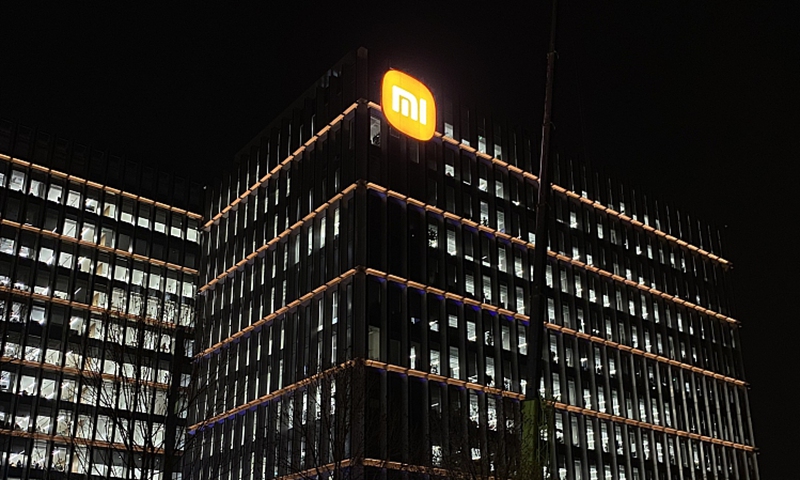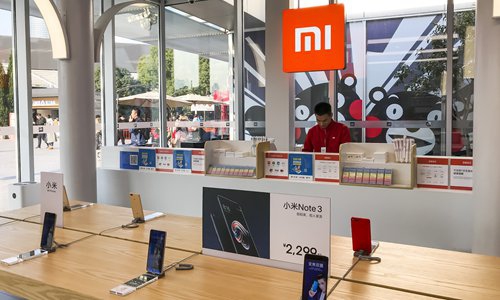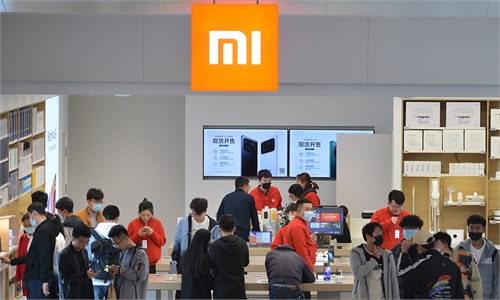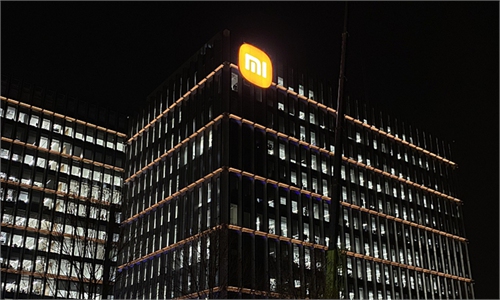Xiaomi removed from US blacklist
Washington restrictions on Chinese tech firms to continue: experts

Xiaomi photo:VCG
Chinese smartphone maker Xiaomi said on Wednesday that it has been formally removed from the US government blacklist, with the company reiterating that it is an open, transparent, publicly traded business.
According to a final order issued by the US District Court for the District of Columbia on Tuesday (US time), it vacated the US Department of Defense's designation of Xiaomi as a "Communist Chinese Military Company" (CCMC), and the court formally lifted all restrictions on US persons' ability to purchase or hold securities of the company.
Xiaomi is grateful for "the trust and support" of all its global users, partners, employees and shareholders, it said in a statement to the Hong Kong Stock Exchange on Wednesday under the name of its chairman Lei Jun.
Lei also posted on Sina Weibo on Wednesday, saying "We won!" Chinese tech-related influencers, including Changan Shumajun, expressed congratulations on the victory.
"It is hoped that more Chinese firms can shake off this US crackdown, and the US should treat Chinese firms fairly and equally," the blogger with nearly 1 million followers said, adding that the more important thing is that Chinese firms could accelerate research and development of core technologies, making the US government unable to brandish its sanctioning stick.
The smartphone vendor reiterated that it is an open, transparent, publicly traded, independently operated and managed corporation, and will continue to provide reliable consumer electronic products and services to its users.
Shares of Xiaomi rose 1.44 percent on Wednesday.
Despite the difficulties it encountered in challenging the US government blacklisting, Xiaomi's victory was within expectations, since the Pentagon's blacklisting was "unconstitutional," Chinese tech analysts told the Global Times. However, the outcome of the case should not lead to excessive optimism - rather, it should keep Chinese technology companies on the alert, they suggested.
Rather than describing the result as one of a Chinese company winning in the US judicial system, Huang Haifeng, an independent tech analyst, said it was rather that Xiaomi had not touched the core interests of the US.
"Xiaomi lacks breakthroughs in the fields of chip design and operating systems. It stands out in engineering fields such as cameras, but it hasn't achieved much in the field of basic science. It is indeed a consumer-oriented company and has nothing to do with the military industry. So being taken off the blacklist is anticipated," Huang told the Global Times.
"Xiaomi set a good example for companies that are still on the US blacklist to defend their interests by litigation, said Zhou Xibing, a veteran analyst who has followed the Chinese tech industry for years.
Zhou said that Xiaomi's US suppliers, like Qualcomm, may have played a role in the case through behind-the-scenes lobbying. "Chinese firms should also make efforts in this respect, to build an effective communications channel via local resources.
"More firms will be inspired by Xiaomi's win to challenge US discriminatory administrative orders or reckless bans," Zhou told the Global Times.
In mid-January, the former Trump administration added Xiaomi and eight other Chinese firms to a list of the so-called CMCCs, the designation requiring US investors to divest their holdings in those firms by a March 15 deadline.
Chinese mapping technology provider Luokung Technology Corp, also on the blacklist, sued the US government in early March, seeking it to be removed from the list. The NASDAQ-listed company received a temporary ruling from a US court on May 5, suspending the ban.
Zhou warned that the ruling doesn't mean an easing of the US competitive stance toward Chinese high-tech industries, and an outright truce seems far away.
According to Huang, the Biden administration's crackdown on Chinese tech companies shows no signs of easing.
"Chinese tech companies cannot fall into the trap where their key technologies and resources rely heavily on others, even though we encourage open markets and cooperation," Huang said.
The removal from the US blacklist came after an early May announcement by Xiaomi saying it had reached an agreement with the Pentagon.
Xiaomi filed a complaint to a US court in late January seeking to be removed from the list. In March, a US federal judge temporarily halted enforcement of the blacklisting.
Separately, FTSE Russell said on Monday that it will add Xiaomi and Luokung back to its global indexes.
Xiaomi will be added to the FTSE GEIS in two tranches, with 50 percent added effective from the opening on June 7, and the other 50 percent added from the opening on June 21, the FTSE said in a statement.
Luokung will be added to FTSE GEIS in conjunction with the June 2021 review, effective from the opening on June 21.



